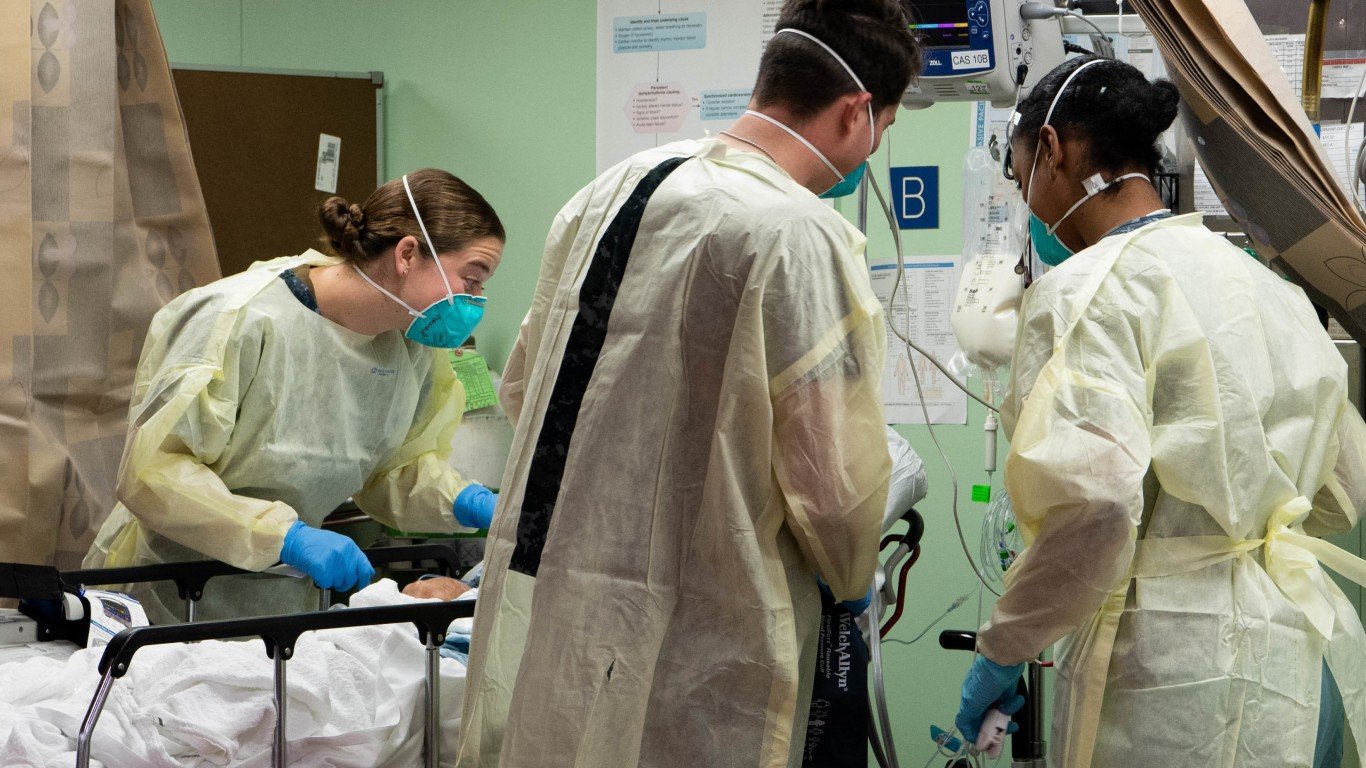

The U.S. reported over 223,000 new cases of coronavirus over the seven days ending April 17, bringing the total count to more than 79.7 million confirmed cases of COVID-19. There have been more than 980,000 COVID-19-related deaths — the highest death toll of any country.
New cases continue to rise at a steady rate. In the past week, there were an average of 9.6 daily new coronavirus cases per 100,000 Americans — essentially unchanged from the week prior, when there were an average of 8.9 daily new coronavirus cases per 100,000 people.
While new data shows that the risk of contracting COVID-19 is high in almost every part of the country, cities continue to be the sites of major outbreaks and superspreader events. Experts agree that the virus is more likely to spread in group settings where large numbers of people routinely have close contact with one another, such as colleges, nursing homes, bars, and restaurants. Metropolitan areas with a high degree of connectivity between different neighborhoods and a large population may be particularly at-risk.
In the 50 largest metro areas, the incidence of COVID-19 grew at an average rate of 12.3 new cases a day per 100,000 residents in the past week — 34.0% greater than the case growth in all counties outside of metro areas.
The Warner Robins, GA metro area consists of Houston County and Peach County. As of April 17, there were 25,165.0 confirmed cases of COVID-19 per 100,000 Warner Robins residents, roughly in line with the national rate. For comparison, the U.S. has so far reported 24,703.3 cases per 100,000 Americans nationwide.
The incidence of coronavirus cases depends on a variety of factors and can vary even between neighboring counties. Within the Warner Robins metro area, Houston County has the highest incidence of COVID-19 cases. As of April 17, there were 25,601.4 cases per 100,000 residents in Houston County, the most of any county in Warner Robins, yet not too far from the county with the lowest incidence. In Peach County, there were 22,696.6 cases per 100,000 residents — the least of any county in Warner Robins.
In order to slow the spread of COVID-19, city and county governments have ordered the closure of thousands of consumer-facing businesses. These measures have led to widespread job loss and record unemployment. In the Warner Robins metro area, unemployment peaked at 10.5% in April 2020. As of November 2021, the metro area’s unemployment rate was 2.4%.
To determine how the incidence of COVID-19 in the Warner Robins, GA metro area compares to the rest of the country, 24/7 Wall St. compiled and reviewed data from state and local health departments. We ranked metro areas based on the number of confirmed COVID-19 cases per 100,000 residents.To estimate the incidence of COVID-19 at the metropolitan level, we aggregated data from the county level using boundary definitions from the U.S. Census Bureau. Population data used to adjust case and death totals came from the U.S. Census Bureau’s 2019 American Community Survey and are five-year estimates. Unemployment data is from the Bureau of Labor Statistics and is seasonally adjusted.
| FIPS | MSA | Population | Confirmed COVID-19 cases as of April 17 | Confirmed COVID-19 cases as of April 17 per 100,000 residents | Cumulative COVID-19 deaths as of April 17 | Cumulative COVID-19 deaths as of April 17 per 100,000 residents |
|---|---|---|---|---|---|---|
| 19140 | Dalton, GA | 143,961 | 45,494 | 31,601.6 | 618 | 429.3 |
| 40660 | Rome, GA | 97,369 | 27,176 | 27,910.3 | 518 | 532.0 |
| 23580 | Gainesville, GA | 198,667 | 53,332 | 26,844.9 | 836 | 420.8 |
| 46660 | Valdosta, GA | 145,315 | 37,570 | 25,854.2 | 509 | 350.3 |
| 15260 | Brunswick, GA | 117,400 | 29,726 | 25,320.3 | 550 | 468.5 |
| 47580 | Warner Robins, GA | 180,652 | 45,461 | 25,165.0 | 624 | 345.4 |
| 12260 | Augusta-Richmond County, GA-SC | 599,616 | 146,090 | 24,363.9 | 2,008 | 334.9 |
| 12020 | Athens-Clarke County, GA | 208,457 | 48,535 | 23,283.0 | 492 | 236.0 |
| 12060 | Atlanta-Sandy Springs-Alpharetta, GA | 5,862,424 | 1,323,216 | 22,571.1 | 15,771 | 269.0 |
| 10500 | Albany, GA | 148,436 | 33,342 | 22,462.2 | 774 | 521.4 |
| 31420 | Macon-Bibb County, GA | 229,504 | 51,275 | 22,341.7 | 1,181 | 514.6 |
| 42340 | Savannah, GA | 386,036 | 85,735 | 22,209.1 | 1,156 | 299.5 |
| 17980 | Columbus, GA-AL | 319,402 | 66,916 | 20,950.4 | 1,152 | 360.7 |
| 25980 | Hinesville, GA | 80,041 | 15,068 | 18,825.4 | 178 | 222.4 |
Essential Tips for Investing: Sponsored
A financial advisor can help you understand the advantages and disadvantages of investment properties. Finding a qualified financial advisor doesn’t have to be hard. SmartAsset’s free tool matches you with up to three financial advisors who serve your area, and you can interview your advisor matches at no cost to decide which one is right for you. If you’re ready to find an advisor who can help you achieve your financial goals, get started now.
Investing in real estate can diversify your portfolio. But expanding your horizons may add additional costs. If you’re an investor looking to minimize expenses, consider checking out online brokerages. They often offer low investment fees, helping you maximize your profit.
Thank you for reading! Have some feedback for us?
Contact the 24/7 Wall St. editorial team.



